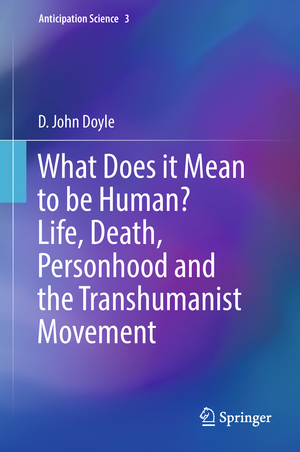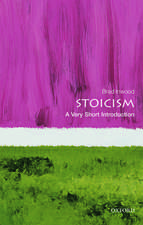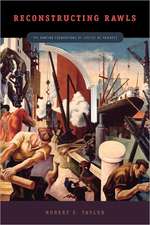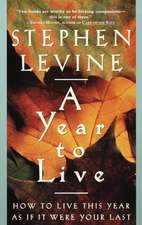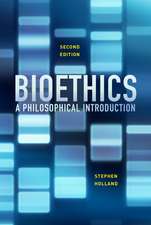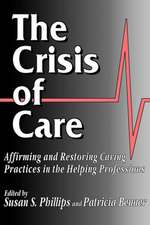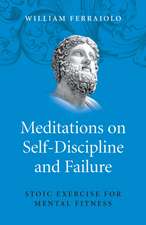What Does it Mean to be Human? Life, Death, Personhood and the Transhumanist Movement: Anticipation Science, cartea 3
Autor D. John Doyleen Limba Engleză Hardback – 18 sep 2018
The author also introduces the notion that death is a process rather than an event, as well as identifies philosophical and clinical limitations in the contemporary determination of brain death as a precursor to organ procurement for transplantation. The discussion on what exactly it means to be dead is later applied to explore philosophical and clinical issues germane to the cryonics movement.
Written by a physician/ scientist and heavily referenced to the peer-reviewed medical and scientific literature, the book is aimed at advanced students and academics but should be readable by any intelligent reader willing to carry out some side-reading. No prior knowledge of moral philosophy is assumed, as the various key approaches to moral philosophy are outlined early in the book.
| Toate formatele și edițiile | Preț | Express |
|---|---|---|
| Paperback (1) | 553.86 lei 38-44 zile | |
| Springer International Publishing – 13 dec 2018 | 553.86 lei 38-44 zile | |
| Hardback (1) | 566.52 lei 38-44 zile | |
| Springer International Publishing – 18 sep 2018 | 566.52 lei 38-44 zile |
Preț: 566.52 lei
Preț vechi: 708.14 lei
-20% Nou
Puncte Express: 850
Preț estimativ în valută:
108.42€ • 112.77$ • 89.50£
108.42€ • 112.77$ • 89.50£
Carte tipărită la comandă
Livrare economică 10-16 aprilie
Preluare comenzi: 021 569.72.76
Specificații
ISBN-13: 9783319949499
ISBN-10: 3319949497
Pagini: 390
Ilustrații: XXIII, 213 p. 3 illus.
Dimensiuni: 155 x 235 mm
Greutate: 0.51 kg
Ediția:1st ed. 2018
Editura: Springer International Publishing
Colecția Springer
Seria Anticipation Science
Locul publicării:Cham, Switzerland
ISBN-10: 3319949497
Pagini: 390
Ilustrații: XXIII, 213 p. 3 illus.
Dimensiuni: 155 x 235 mm
Greutate: 0.51 kg
Ediția:1st ed. 2018
Editura: Springer International Publishing
Colecția Springer
Seria Anticipation Science
Locul publicării:Cham, Switzerland
Cuprins
Chapter 1. Introduction.- Chapter 2. Biomedical Ethics.- Chapter 3. Humans, Transhumans and Humanoids.- Chapter 4. Pharmacologic Enhancement: Possibilities and Perils.- Chapter 5. Life, Death, and Brain Death.- Chapter 6. Cryonic Life Extension: Scientific Possibility or Stupid Pipe Dream?.- Chapter 7. Defending Attacks Against Transhumanism.- Chapter 8. Conclusions. Appendix.
Textul de pe ultima copertă
This book is a critical examination of the philosophical and moral issues in relation to human enhancement and the various related medical developments that are now rapidly moving from the laboratory into the clinical realm. In the book, the author critically examines technologies such as genetic engineering, neural implants, pharmacologic enhancement, and cryonic suspension from transhumanist and bioconservative positions, focusing primarily on moral issues and what it means to be a human in a setting where technological interventions sometimes impact strongly on our humanity.
The author also introduces the notion that death is a process rather than an event, as well as identifies philosophical and clinical limitations in the contemporary determination of brain death as a precursor to organ procurement for transplantation. The discussion on what exactly it means to be dead is later applied to explore philosophical and clinical issues germane to the cryonics movement.
Written by a physician/ scientist and heavily referenced to the peer-reviewed medical and scientific literature, the book is aimed at advanced students and academics but should be readable by any intelligent reader willing to carry out some side-reading. No prior knowledge of moral philosophy is assumed, as the various key approaches to moral philosophy are outlined early in the book.
Caracteristici
Critically examines present and future technologies for human enhancement Identifies strengths and weaknesses in the transhumanist and bioconservative arguments for and against human enhancement Introduces the notion that death is a process rather than an event Identifies philosophical and clinical limitations in contemporary brain death determination Clarifies philosophical and clinical issues in the realm of cryonic suspension
